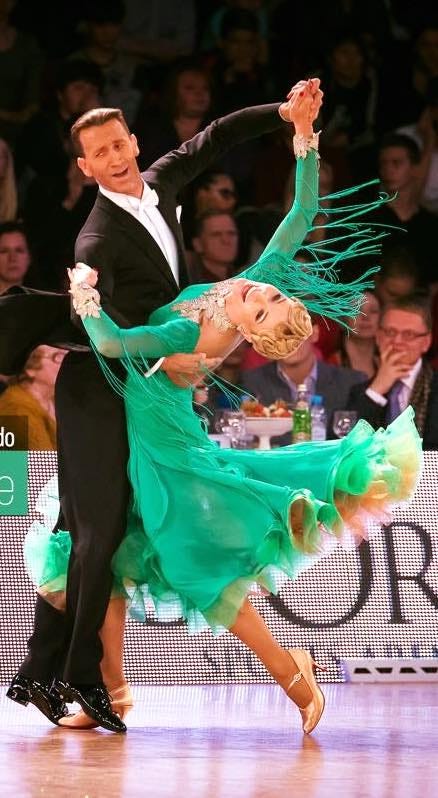This article first appeared in Dance Today, in April 2013, with the following intro: Almost a year after they split, Mirko Gozzoli and Edita Daniute, one of the most exciting ballroom couples in the world, returned to competitive dancing at Bassano del Grappa in Italy. Chindu Sreedharan speaks to Edita about their comeback. Excerpts:
Could we start with the Bassano competition? What was it like to walk back on to the floor again?
We knew anything could happen if we didn’t do that good. Normally, the first rounds are quiet. Here it was full on. Everybody was shouting and the pressure was there big time from the first round. In a way you enjoy the support, but in another way it is a stress. Especially for me, because many people had asked me why do I need to do that, why I need to come back to compete. The answer is that I love dancing and if you are not crazy enough [to try], you are not going to achieve anything. I don’t still feel that old, and I don’t feel I can’t produce anything new myself. Till I can produce something new myself, I would like to enjoy it.
How did you and Mirko get together again?
He came to my training camp in the summer and we practiced a bit. We still have some business that we were supposed to do together — like teaching trips. And we did a few of those and we practiced. We enjoyed that. We didn’t fight as much as before. Actually we didn’t fight at all. So we kind of– we found again the joy of dancing. And that was partially to do with not competing.
Did you miss competing?
No. I was okay even without competition. Mirko was the one who wanted to compete. He never wanted to retire. He decided to split with me because I was asking him to travel more, to come more to Lithuania, and he needed to stay in Italy. This was the main disagreement.
In an earlier interview, you had said you missed competing so much that you were crying while judging, and that was why you decided to compete again after you had your daughter. But this time, you didn’t miss competing. What had changed?
Then I felt I had not competed in professionals. I hadn’t finished my career the way I wanted. Then I felt really bad. But this time, when Mirko decided to split and I retired, I didn’t feel too bad. Absolutely not.
Why was that?
Before this time, there were a lot of fights. When you are struggling to win, to get to the first place, there are many people who give their advice. Normally people try to find the person who is guilty. So my dresses were wrong, my dancing was wrong. Obviously because Mirko was a champion with Alessia [Betti] and not the champion with me, the whole world tried to improve me. I got a lot of pressure and I wasn’t enjoying my dancing. That was why I felt quite a relief, instead of sadness and missing the competition. Because my personality is very different from Mirko’s previous partner. And I am who I am. And as a dancer you have to find your own personality. You cannot copy because that will be worse.
How did the decision to compete again come about?
Mirko wanted to compete in WDC, to come back, to prove something to Arunas [Bizokas], to beat him. Since I retired, I have taken some business with WDSF. In Lithuania we have a strong WDSF federation. So I had already made a choice. It’s sad that somebody has to make a choice. I really do not think it should matter which federation you belong to, but sadly you have to choose these days. And I have chosen WDSF because I was already judging there. I suggested to him to take part in the WDSF competitions. And he agreed, and that’s how we ended up in Bassano.
At Bassano there appeared to be a level of energy that you don’t usually see among professionals.
If you speak about WDC and WDFS, one federation has gone towards the energy a lot, another federation has gone towards quality. But both federations are missing something. The WDSF is missing a little bit on the quality; WDC is missing on the energy. In ballroom the energy of the final is not there. All the couples, they are trying to produce something the audience appreciates, but of course they want to be judged as well. To give you an example, when I was competing in the WDC, all my kicks were too high, all my shapes were too big, everything was too much. I couldn’t do anything.
When we competed with Mirko before, we have always felt supported by the crowd. So that was something that was always very nice for us. When we were competing against a quiet couple like Arunas, everybody decided it [what we were doing] was too much. Naturally we tried to go quiet. Then the audience doesn’t appreciate that. So the question was, what do we do? Do we make the crowd love us, or do we make the judges mark us? That was always the question before.
And now?
Now it is just us. That’s the beauty of it. In this federation everybody loves Mirko style. We are not trying to please anyone. We are trying to be ourselves.
You seemed to be dancing differently in Bassano — bigger shapes, head rolls you haven’t done before —
I was not allowed before, my God. I was not allowed! Too much is not good, too much is cheap, I agree with that. Ballroom has to look like ballroom. But some spice wouldn’t do any harm. To keep it so conservative, it is not good. It is not good because Latin is interesting, and ballroom is, you know, you can go to sleep. So something has to change. We always wanted to do that. But it is just that we have been pushed down too much for it. We changed our style in so many ways, but nothing suited us. Mirko is a very energetic dancer, and me too. The way the judges wanted to see us, we didn’t see us. This was the biggest problem.
Was it one of the reasons why you didn’t beat Arunas?
It is actually why I felt so happy when I retired. Why we didn’t beat Arunas, it was also for political reasons. He’s a great dancer, and I do respect him, and I think they are an amazing couple. But with this type of dance, we could have had greater competition. We didn’t touch — we didn’t really compete — with them. They kept it very clear.
Experimentations also leave you open to criticism. How do you deal with that?
The people who don’t like that, they are still watching us. That means they couldn’t ignore us. If they are interested to see me, it means I am good. And I enjoy that — no matter what they write!
Everywhere the crowd seems to love you. Why do you think that is?
Because people know who is doing it for the name, who is doing it for the money, and who is doing it for the love of dance. People just absolutely see that we love dance.
Does that also have to do with the way you dance?
We do it 100% and we kind of take risks. I will give you an example. One time in quickstep, one judge was standing more out into the floor. We were running into him, and Mirko did a running circle around him. I knew this judge was going to destroy us. And I checked the marks, and he marked us sixth in QS. What Mirko did was crazy and the people loved it. But in the end from the judges we suffer. But the ability to risk is something that is very attractive to the audience. To play with your dance and enjoy it — but you can suffer for it. Some people choose to have a safer way, and the safe way guarantees winning. But the safe way will not always guarantee the love of the crowd.

Speaking of the crazy things that happen on the floor, the Mirko trick of releasing hold to get around couples who block you —
It is actually not a Mirko trick. It’s a Fabio [Selmi] trick!
Okay. I remember the first time Mirko tried that with you at the UK Open it didn’t work. At Bassano it seemed to work.
Yeah, yeah [laughs]. It has nothing to do with me. It has only to do with Mirko! He decides and he does it. And I have two choices. To stop — which would look very stupid. Or just to go with it. It was completely unplanned and it had only to do with Mirko.
So he’s the one to blame.
Yeah! But this particular joke, I am not fond of it. Normally I am telling Mirko off for it. It makes Mirko feel good, so he does it. But it is not my thing [laughs].
As a couple what would you say are your major strengths and weaknesses?
Our biggest weakness is that we live in different countries. The organisation of competition and practices, this is big issue. Our strength is our crazy personalities. We are both challenging each other to find new things, find new choreographies and experimenting. I feel we both have very strong fundamentals to let us experiment with it, for all the innovations. Without the basics, you cannot experiment.
What goals have you set for yourself now? What can we expect from the partnership?
Now we want to see what every day brings. No long-term goals set! We want to enjoy our career day by day. We want to focus on improving quality and not worry about results.
Photos: courtesy Edita Daniute
Ballroom Dancesport Edita Daniute Interview Mirko Gozzoli WDF

Previous Next